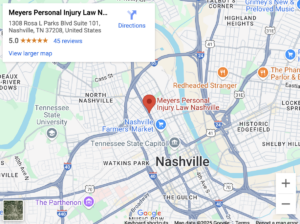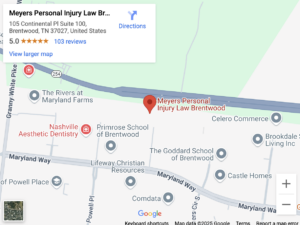Meyers Personal Injury Law | July 31, 2024 | Personal Injury

Receiving a settlement from a personal injury lawsuit can bring financial relief during a difficult time. However, understanding the tax implications of your settlement is crucial to managing your finances effectively. In this blog, we’ll explore whether personal injury lawsuit settlements are taxable in Tennessee and provide insights to help you navigate this important aspect of your compensation. Contact Meyers Personal Injury Law right away if you have any additional questions or concerns.
Understanding State Tax Laws
When faced with a personal injury lawsuit, understanding the tax implications can be crucial. Many may wonder if their personal injury settlements in Tennessee are taxable. The good news is that most personal injury settlements in Tennessee are not taxable, particularly those that compensate for physical injuries or illness.
Personal injury settlements can vary widely depending on the nature of the case. These settlements might include compensation for medical expenses, pain and suffering, and lost wages. While compensation for physical injuries is generally non-taxable, any portion of the settlement allocated for lost wages may be subject to taxation.
The structure of a settlement also plays a role in its tax implications. Whether the amount is received as a lump sum or through periodic payments can influence the taxes owed. It’s vital for individuals to understand these nuances and how they apply to their specific case. For more detailed information, please contact the personal injury lawyers at Meyers Personal Injury Law. We can tell you more about how our state’s laws affect your specific situation.
Taxability of Personal Injury Settlements in Tennessee
Understanding whether personal injury settlements are taxable in Tennessee involves examining both general IRS rules and state-specific regulations. Here’s a detailed look at each.
General IRS Rules on Settlement Taxes
According to the IRS, many personal injury settlements are not taxable. Settlements received for personal physical injuries or physical sickness are generally not counted as taxable income. For instance, if a person receives compensation for medical expenses, pain, and suffering due to a physical injury, these amounts are typically non-taxable.
However, there are exceptions. Any portion of a settlement that compensates for lost wages or punitive damages is subject to taxation. The IRS requires individuals to report these amounts as they are considered replacement for earnings, making them taxable.
Tax-free components:
- Medical Expenses
- Pain and Suffering
Taxable components:
- Lost Wages
- Punitive Damages
Specific Regulations for Tennessee
In Tennessee, the taxability of personal injury settlements aligns closely with federal rules but has some nuances. State-specific regulations emphasize that settlements from personal injury cases, such as those involving car accidents or premises liability, are generally non-taxable if they cover physical injuries or sickness.
However, Tennessee law notes that lost wages included in a settlement could be taxable. This is particularly relevant in employment-related cases where damages paid are viewed as income replacement. Comparatively, punitive damages awarded in Tennessee are also taxable, mirroring federal guidelines.
Additionally, certain types of settlements, such as those paid in lump sums, may incur significant taxes depending on how they are structured. Individuals must be aware of these distinctions to properly prepare and report any potential taxes owed.
For further details, you can refer to additional information on specific regulations for Tennessee and the IRS guidelines.
Compensation Taxation Details
In Tennessee, the tax implications of personal injury settlements can vary based on the type of compensation received. Understanding which types of compensation are taxable is essential for accurate financial planning.
Taxable Types of Compensation
Some aspects of personal injury settlements are taxable in Tennessee. Punitive damages, which are awarded to punish the defendant rather than to compensate the victim, are always taxable. Lost wages compensated through the settlement are also taxable because they replace income that would have been earned. Any amount received as interest on the settlement amount is taxable as well. These taxable awards need to be accurately reported on your tax return.
Physical Injury and Sickness
Compensation received for physical injury and sickness in Tennessee is generally not taxable. According to IRS guidelines, this includes amounts received to cover medical expenses, prescription medications, and other health-related costs. Pain and suffering related directly to physical injuries or sickness are also excluded from taxable income. It’s important to keep detailed records and documentation of medical treatments and expenses to support the non-taxable status of these compensations.
Emotional Distress and Lost Wages
While amounts received for physical injuries are typically not taxed, emotional distress can be a different matter. Compensation specifically for emotional distress may be taxable unless it originates from a physical injury or sickness. This includes compensation for therapy and other treatment costs. On the other hand, lost wages paid as part of a personal injury settlement are taxable. They are treated as ordinary income, just as the wages would have been if earned normally. Careful categorization of these damages is needed to ensure correct tax reporting and compliance.
Exceptions to Taxation
Certain aspects of personal injury settlements in Tennessee may be exempt from taxation. Compensation for physical injuries or sickness is often non-taxable. According to the IRS, settlements for visible injuries like broken bones or illnesses fall under this category.
Emotional distress is generally taxable unless it stems directly from a physical injury. For instance, emotional distress caused by a car accident that resulted in physical harm might not be taxable, while distress from a work-related issue without physical injury usually is.
Medical expenses reimbursed by the settlement that were not previously deducted on tax returns are typically non-taxable. This helps prevent double benefit scenarios.
Punitive damages are taxable. These are awarded to punish the defendant and are not meant to compensate for actual losses suffered by the plaintiff.
- Physical Injuries or Sickness: Non-taxable
- Emotional Distress from Physical Injury: Non-taxable
- General Emotional Distress: Taxable
- Reimbursed Medical Expenses: Non-taxable if not previously deducted
- Punitive Damages: Taxable
Awareness of these exceptions helps ensure accurate tax reporting. Understanding these distinctions can aid in better financial planning post-settlement. If you have any additional questions about your specific personal injury settlement, the attorneys at Meyers Personal Injury Law are always here to help.
Contact Our Nashville Personal Injury Law Firm Today at Meyers Personal Injury Law
If you were injured in an accident in Nashville or Brentwood and need legal help, contact our Nashville personal injury lawyers at Meyers Personal Injury Law to schedule a free case review today.
Meyers Personal Injury Law Nashville
1308 Rosa L Parks Blvd Suite 101,
Nashville, TN 37208
(615) 258-9000
Meyers Personal Injury Law Brentwood
105 Continental Pl Suite 100,
Brentwood, TN 37027
(615) 258-9000



